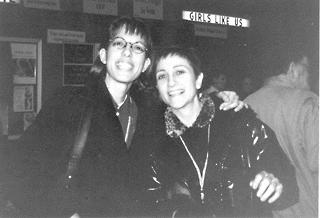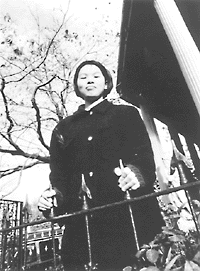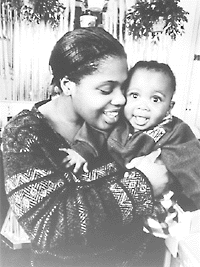Girls in the Hood
Girls Like Us: The Texas Documentary Tour
By Jason Silverman, Fri., Feb. 6, 1998
|
|
|
Lisa |
"When you do a vérité film, of course it is impossible to know what will happen in your subjects' lives. You can't plan other people's lives." DiFeliciantonio grew up in the same working-class South Philadelphia neighborhood that her subjects did. She was familiar with some of the more universal adolescent problems that Lisa, De'Yona, Anna, and Raelene wrestle with in the film - boys, school, parental pressure. But DiFeliciantonio and Wagner also discovered that their four subjects, each the child of an increasingly rough urban world, were forced to cope with some intimidating and relatively new teenage hurdles. Drive-by shootings, drugs, homelessness, AIDS, and teenage pregnancies have become a familiar part of the contemporary urban landscape.
As a result, the journeys of the four young women are at times achingly difficult. One of Anna's friends, experimenting with rebellion against her very strict parents, is kicked out of the house after carving her boyfriend's name into her arm. Forced to find her way on the drug-plagued streets, the girl is terrified, and Anna worries for her safety. Lisa, a top student at a Catholic school and the daughter of a three-time divorcée, resents the misinformation about sexuality that is disseminated by her teachers. Deciding that a little straight talk and first-hand experience could go a long way, she begins experimenting with a series of boyfriends, finding that some are less respectful than others. De'Yona, a gifted gospel singer and a leader at a high school for the performing arts, seems destined for fame, but when her cousin is killed in an act of random violence, she loses focus and fails out of school. Raelene, the daughter of a drug-using mother, has at 16 already had a child, a miscarriage, an abusive boyfriend, and a string of lovers.
|
|
Lisa, De'Yona, Anna, and Raelene grew up within a two-mile radius, but none knew the others. In fact, each seems to come from an entirely different world and serve as a stereotype-confounding representative of an important South Philly ethnicity. Anna is first generation Vietnamese-American, De'Yona is African-American, Lisa is Italian-American, and Raelene is white. While shooting Girls Like Us, Wagner was primarily responsible for sound recording and DiFeliciantonio for camera. Together, the two edited nearly 300 hours of Super-8 footage into an hour-long work. DiFeliciantonio and the London-born Wagner met as graduate students in Stanford University's documentary filmmaking program. They founded Naked Eye Productions upon graduating in 1988, and in the 10 years since have created a number of works for radio and TV: 1997's Two or Three Things but Nothing for Sure, a short documentary about the author Dorothy Allison (Bastard Out of Carolina), which won numerous festival awards in 1997; Culture Wars, a 1995 PBS documentary; Una Donna, which aired on National Public Radio; and Twinsburg, OH: Some Kind of Weird Twin Thing, broadcast on PBS. In addition, both Wagner and DiFeliciantonio have found success making films on their own. DiFeliciantonio won an Emmy Award for her documentary Living With AIDS, and worked on feature films including Kama Sutra, Philadelphia, and HBO's Citizen Cohn and Truman. Wagner's short film Tom's Flesh won an award at the 1995 Sundance Film Festival, and she also created the acclaimed films Hearts & Quarks and Women, Children and AIDS.
|
|
Heller said she was impressed with how deeply Wagner and DiFeliciantonio connected with their subjects - the filmmakers seemed to build a real rapport with the teens, who are responsive, forthcoming, and honest. DiFeliciantonio believes the use of video and the small crew was instrumental in helping form the bond between subjects and filmmakers. "The size of the crew definitely affects the dynamic," she said. "It was just Jane and I, and it allowed for an immediacy and intimacy. With a big crew, the director's mind can be somewhere else, and it is distracting. The people you are dealing with can feel it. Filmmaking is kind of like acting - you have to be present in the moment."
The Texas Documentary tour will present Girls Like Us on Wednesday, February 11 at the Alamo Drafthouse. There will be two screenings, with doors opening at 6:30 and 9pm. Admission is $5 for the general public; $3.50 for Austin Film Society members and UT students. Jane Wagner and Tina DiFeliciantonio will be on hand to introduce the film and conduct a Q&A session afterwards. The Texas Documentary Tour is a co-presentation of the Austin Film Society, the University of Texas RTF Dept., The Austin Chronicle, and SXSW Film.










